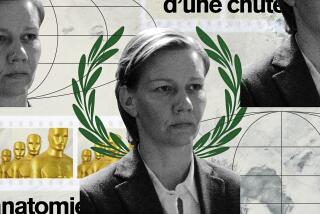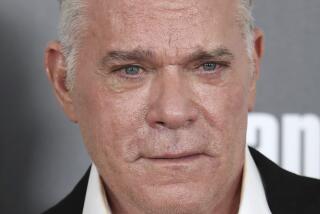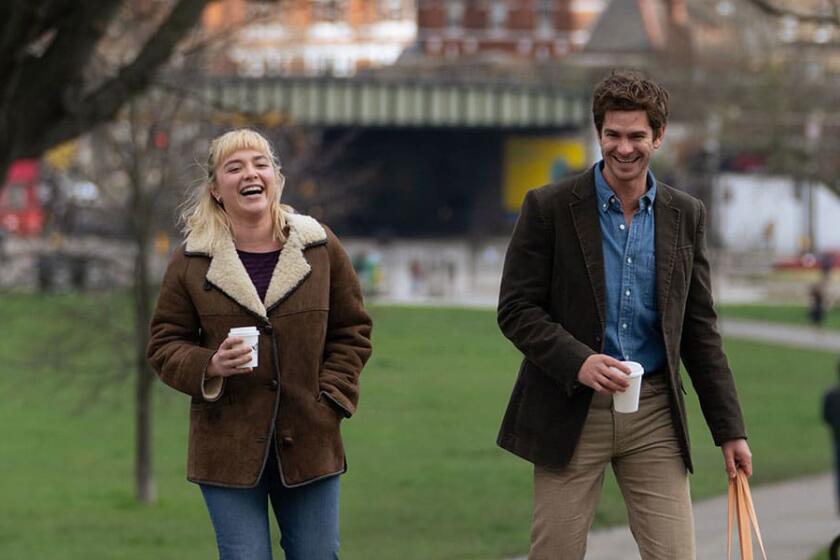What happens when you put ‘Beauty and the Beast’ stars at a piano with composer Alan Menken? Disney magic

“Beauty and the Beast” actors Josh Gad and Luke Evans, along with composer Alan Menken, talk about the impact of the song “Gaston.”
In the alarmingly beige conference room of a Beverly Hills hotel, the man who helped launch six princesses, more than a dozen musical films, and a national songbook of singalongs sits down at a piano.
And immediately “beige” is no longer accurate.
With just a few immediately evocative chords from Oscar-, Grammy- and Tony-winning composer Alan Menken, an equally familiar voice rises in glorious crescendo.
“Perfect adored paragooooon,” sings Josh Gad with that unmistakable combination of bravado and vibrato. It’s a sound he honed as Elder Cunningham in the original Broadway production of “The Book of Mormon,” made ubiquitous with his portrayal of “Frozen’s” beloved snowman Olaf and now brought to Disney’s new live action film “Beauty and the Beast.”
Gad, of course, is neither Beauty nor the Beast; he’s singing LeFou, the bumbling buddy of the story’s self-obsessed villain Gaston, played by Luke Evans, who gamely answers the musical call and harmonizes with Gad’s high note.
“We live in the clouds,” Gad jokes about their range. The many fans already following the duo’s singing Instagrams will not be surprised to know that the Evans and Gad pairing has already been praised as the film’s standout performance.
But before they can get into the next verse Evans stops; he’s forgotten the chorus. “So what’s the line?” he asks. “‘No one’s quick as Gaston, no one’s thick as Gaston’?”
Menken, at the piano, shoots Evans a phony look of disbelief, and loudly reminds the room that he’d handed out the lyrics to everyone earlier. The composer, of course, not only wrote the score for “Beauty and the Beast” (with lyrics by the late Howard Ashman), but also “The Little Mermaid,” “Aladdin,” “Enchanted,” “Little Shop of Horrors” and many others.
“I don’t know the lyrics because I don’t sing them,” Evans pleads. Gad, as helpful as his on-screen character, rapidly recites the lyrics from his villainous tribute.
It’s a chain reaction that brings Menken back to the piano, and Evans into full Gaston mode. Chest out, head back, he blossoms into a man who most certainly would use antlers in all of his decorating. And, sheesh, were his shoulders this big a moment ago?
The magic is real; it feels like a rowdy 17th century tavern in here, if only for a while. That has been the concern all along, whether the live action film could recapture the thrill of the original film. From the moment Menken’s swirling, delicate refrain danced with the foreboding bass of the animated film’s prologue, the audience knew something special was coming. Twenty-five years later, that same feeling of anticipation is back, conjured, with the aid of one piano, by three guys in a conference room having a grand time talking about the next generation of “Beauty and the Beast.”
Because if it’s not baroque…
This is a musical brain trust, Luke Evans, Josh Gad and Alan Menken the Disney legend, the Broadway legend…
Evans: Oscar-winning… Tony-winning.
Gad: You are, you’re a legend. You’re more than that. How many awards do you have, can you even count them at this point?
Menken: Awards in total?
Gad: Yes. And they can include high school awards. You’ve got to be a Guinness record holder.
Menken: All I’ll say is I do not have the E from EGOT. Except I have an honorary E. And I got an R for Razzie. Worst song of the year!
Gad: Somehow all I’ve got is the G. I won the Grammy and nothing else.
Menken: You didn’t get the Tony for “Mormon”?
Gad: We don’t talk about it. Moving on. Moving on.
Menken: You damn well should’ve.
Gad: Oh I love you, Menken.
Josh and Luke, how did it feel when you found out you were going to perform Menken’s music?
Gad: I was 10 years old when “Beauty and the Beast” came out. The distinct, vivid memory that I have is sitting in a theater in South Florida, and the audience breaking out into applause at the end of “Gaston,” at the end of “Be Our Guest” and, of course, at the end of the ballroom dance of “Beauty and the Beast.” And that left this indelible impression on me. Those songs are the soundscape to my childhood, and now to my own kids. So being able to bring one to life is incredible.
Evans: I was 12 years old. I came out [of the movie] humming the tunes, didn’t know the lyrics. Waited for the album to come out, got my mum to buy it for me. Read the little booklet, learned all the songs and then the show came out, the Broadway show. It came to London, I saw it opening night. So it’s part of my life the whole way through. It is like a soundtrack to one’s life, isn’t it?
Is there a particular line that you sing that made you feel like a kid again while you were singing?
Evans: Mine has to be, [sings] “I’m especially good at expectorating…”
Menken: “Tooey! Ten points for Gaston!”
Gad: I remember the first time practicing, when I found out I got the role. The first time I rehearsed it by myself, I was in my office and I was singing it. I had a friend, Rory O’Malley, staying above me on the second floor. He comes downstairs and he goes, “That’s such an interesting audition song to choose. What are you singing for?” And I go, “Actually playing LeFou in the new ‘Beauty and the Beast.’”
It was so out of body and surreal to be singing this song that I grew up so reverential of, and the songs that you and Howard wrote. Whether it’s “Gaston,” whether it’s “Be Our Guest,” or whether it’s, “Friend Like Me,” or “Part of your World,” those songs take you to a place and a time, and I can remember every screening that I went to of each of those movies. Those songs defined that experience. So thank you, Menken. You deserve all 3,000 awards that you’ve won. Am I in the right ballpark?
Menken: Give or take.
What does it take to write a great villain song?
Menken: Stay true to character and stay true to the story. You don’t think “villain song,” you think it’s a song for this character who’s got this emotion, who’s got this intention. And you have to think, is it going to be a song like “Hellfire,” [from “The Hunchback of Notre Dame”], which is not comedic in the slightest, or is it going to be like “Gaston” or the “Dentist” song from “Little Shop [of Horrors”], which intend to be hilarious. Villains always come in a lot of shapes and sizes and just got to serve you well.
Evans: That’s right. Serve me well.
Gad: The first villain song that I remember seeing in a Disney movie was actually Ursula’s in “Little Mermaid.” [Sings] “I’m afraid in the past I’ve been a baddie. Na na na na ... well a witch.” Which when you play it off the piano sounds like something you would hear at a temple on Yom Kippur. At that time, I feel like there weren’t a lot of villain songs. Was that a new sort of twist that you guys played?
Menken: There weren’t a lot of theatrically structured Disney animated movies, or hadn’t been for a generation. So in reaching out to Howard Ashman, and me, to come and do “Little Mermaid,” there was overt desire to have musical theater transferred to Disney. Certainly there was a lot of music-theater smarts in “Pinocchio” or other Disney classics, but we were a different generation. I always say I think “Little Mermaid” is Howard’s and my follow-up to “Little Shop of Horrors.” Some people call “Part Of Your World, “Somewhere That’s Wet.” We kind of delved into, “What is the Disney ethos?” Part of the Disney ethos is bringing in very specific musical styles. So for “Mermaid” we brought the sea shanty to Brecht and Weill for that scene. That’s really what “Poor Unfortunate Souls” is, very Brecht and Weill. German cabaret and calypso.
Evans: Do you remember which song you wrote first [for “Beauty and the Beast”]?
Menken: I think it was “Belle” and Howard was terrified. Howard did not want to send the song on to Disney. He said, “Who asked for a six and half minute opening number? Are we crazy?” He literally said, “This is going to get around, people are going to laugh at us.” I said, “I think it’s really good, Howard. I think it’s really good.” He was tearing his hair out. And in those days you couldn’t just send an MP3 and an hour later, “Oh my God, it’s great!” You stuck it in the mail and waited. And they loved it. I believe that was the first one. That and “Be Our Guest.”
There’s lots of new music in the live action film. The Beast has a new song and Belle has a song and Gaston has a song. But LeFou doesn’t have a song.
Gad: Yeah, what’s that about? I’ve been meaning to ask you the same thing.
Menken: Well…
Gad: You were holding it for the sequel.
Menken: I’m writing a whole musical for you, Josh. We’re doing a project that is actually a Josh Gad vehicle.
But what would a LeFou song sound like, what do you think he would want?
Menken: You can’t just serve characters. What you’re serving is the story. Where would LeFou’s song moment be?
Gad: I know what it would be. [Sings] “Food, glorious food.”
Menken: Frankly, much of Gaston is LeFou.
Evans: And is sung by LeFou.
Gad: The reason that I did the movie is because that song is such, it really is a duet. It’s an amazing duet, but it’s LeFou’s hero worship of this guy. He’s like a historian and celebrates this guy’s legacy and that’s what makes it so funny. And thank you for raising it an octave for Luke and I, because now we have to sing it live all the time.
Evans: That is our own fault. The curse of the two tenors.

Emma Watson, Dan Stevens and Luke Evans star in the live-action movie “Beauty and the Beast.”
You revived a lot of old lyrics that were lost for this movie. What was that like hearing those lyrics again?
Menken: Great. That was great. And also, hearing at the end of the movie, the long lost verse from “Beauty and the Beast” that Howard wrote. Oh man.
I gotta say, [director] Bill Condon is really smart. Because it was really Bill who reached in and said, “I want to do that.” That was huge, Bill having that curiosity and willingness to open it up. There is a little treasure-trove of lost Ashman that’s wonderful.
When you’re actually filming “Gaston” what were the director’s notes? Did he say, “Don’t worry about going too big?” What’s the balance between villainy and comedy?
Evans: There was a lot of, there was a lot of…
Gad: I think she’s just saying we mugged it.
Evans: You mean we were theatrical about our performances? We had a lot of rehearsal. So we worked out the level and the size of our performances from the rehearsal room. Because it is a larger-than-life moment, in the film there’s this huge group of people being rallied by one to make the ego of another feel grand. And so there is a very sort of jolly atmosphere in that room and everybody’s had a beer or two and music is playing. I think we had a license to be a little larger than we would have been outside of the tavern because the tavern was a place of frivolity and happiness.
Gad: I remember one of my favorite songs growing up. Have you guys seen the original ‘Pete’s Dragon’? When they’re going to the tavern and [Mickey Rooney is singing], “A dragon, a dragon, I swear I saw a dragon.” That sort of felt like that was the spirit of what we were doing. The song is so infectious that you want people to watch it and feel like they want to be in this tavern and jump onto the table and sing Gaston’s praises alongside you.
Menken: Also, Howard’s lyrics are hilarious. I actually found recordings of me working — because I used to keep them on cassette — and I get to, “Every last inch of me’s covered with hair.” And I just crack up, I just stop. “I use antlers in [all of my decorating].” Imagine, looking at that lyric for the first time. You had to know Howard too, he was just beating Gaston senseless. And it was delicious.
It’s a very happy villain song as well, it’s hard not to get caught up in it.
Menken: You know it may be one of the happiest villain songs ever, it’s true.
Evans: I was watching the audience [at the recent premiere], everyone’s really into that scene. There were people just moving along. It just rouses everyone.
Menken: They love Gaston. They did applaud when you died.
Evans: They applauded when I died.
Gad: I led the applause.
Evans: You did. You whooped along. I didn’t even hit the ground and you were already clapping.
Gad: My daughter said, “Daddy, why are you laughing, he’s horrible.”
Evans: Right here [points to chest]. It was wonderful.
See the most-read stories in Entertainment this hour »
Twitter: @MdellW
ALSO:
Alabama theater will not show ‘Beauty and the Beast’ because of gay story line
Emma Watson tracks her looks from ‘Beauty and the Beast’ press tour using Instagram
Disney, HSN collaborate on ‘Beauty and the Beast’ collection
More to Read
Only good movies
Get the Indie Focus newsletter, Mark Olsen's weekly guide to the world of cinema.
You may occasionally receive promotional content from the Los Angeles Times.










